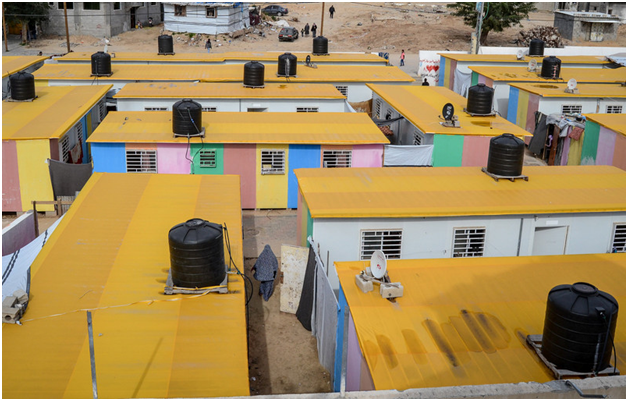COLOUR AMIDST GRIEF AND UNCERTAINTY

For the past eight months, Muhammad al-Kafarna has been living in a caravan.
“Our nights are dark with no way of heating the caravan,” he said. “We don’t have warm water to cook or to wash. Winter is a nightmare for us.”
Al-Kafarna has lacked proper shelter since Israel’s attack on Gaza in the summer of 2014. Despite promises of international reconstruction aid, he and his family have to survive in a caravan provided by the local authority ofBeit Hanoun, a town in northern Gaza.
A civil servant, he has not been paid a salary since 2011 because of the political rift between the Palestinian Authority in the West Bank and the Hamas government in Gaza.
“I’m sinking in debt and can’t provide food for my eight kids and two wives,” he said. “Two of my sons have special healthcare needs but I cannot afford to pay for them. And the caravan is too small to accommodate us or our belongings.”
More than 140,000 homes of Palestinian refugees were damaged during the 2014 offensive. Of them, 9,000 homes were totally destroyed.
Rebuilding and repairing those homes has been slow — Israel has severely restricted the entry of essential construction materials into Gaza.
In November last year, UNRWA, the UN agency for Palestine refugees, confirmed that only one house had been rebuilt by that time.
In a more recent report, UNRWA stated that 7,148 refugee families whose homes were completely destroyed still had not received any reconstruction aid. That was 17 months after the offensive had concluded. UNRWA has estimated that the total costs of reconstructing those homes would be $321.6 million.
The Tamer Institute for Community Education is trying to reach out to Beit Hanoun’s caravan dwellers.
Committed to free expression and the right to education, the group asked teenage girls living in the caravans about how some happiness could be brought into their lives.
As a result, it decided to paint the caravans.
“People here are hopeless and their life is colorless,” said Shadi al-Sheikh, who coordinates many of Tamer’s activities in the area. “They are surrounded by white caravans, white UNRWA schools, no trees. So we had to paint their lives again.”
Today, the caravans are decorated with bright shades of green, pink, blue, yellow and orange. The paint has been applied by the caravan residents — both children and adults — themselves.
An elderly woman living in one of them summed up the general feeling when she said that before Tamer’s project was undertaken, “we had no idea that colors could give us hope.”
Muhannad al-Afifi, a program assistant with Tamer, said that the suffering of Gaza’s people has increased in recent years but “their voices are not being heard.”
To address that problem, Tamer asked international organizations to visit Gaza. In response to that appeal, Tamer secured enough funding to establish mobile centers in five of Gaza’s caravan camps, including Beit Hanoun.
One priority has been providing local children with psychological support.
Arranging for counselors to visit children has proven “very useful in changing the lives of children with mental problems caused by war or by difficult circumstances,” said al-Afifi.
Despite the much-appreciated color, there is a great deal of uncertainty about the future.
Yaqoub al-Kafarna, a 27-year-old living in one of Beit Hanoun’s caravans, said that Tamer has provided important activities for children.
Yaqoub al-Kafarna and his family had to leave their house and take shelter in an UNRWA school “after having our neighborhood bombed for days” in 2014, he said. The UNRWA school was then also bombed. “Danger was everywhere,” he added.
The family has been promised aid to repair their home and to meet their accommodation needs. But they still have not received those payments.
“Now, it’s our eighth month living in caravans, without having any of those promises fulfilled,” he said.
Mousa Abu Amsha, a 36-year-old construction worker, said there are problems with the camp where the caravan is located.
“The camp is built in the lowest area of Beit Hanoun,” Abu Amsha said. “In winter, all the rainwater flows here. So we have to stay inside our caravans for days.”
He added that the caravans are cold because of the material with which they have been made. Local families cannot afford to heat them, he said, and “in the winter, the caravan gets as cold as a refrigerator.”
(Mousa Tawfiq is a student and musician based in Gaza City.)
(Electronic Intifada)



